Virus Bulletin
Copyright © 2024 Virus Bulletin
In the Q1 2024 VBSpam test – which forms part of Virus Bulletin’s continuously running security product test suite – we measured the performance of a number of email security solutions against various streams of wanted, unwanted and malicious emails. One third of the solutions we tested opted to be included in the public test, the rest opting for private testing (all details and results remaining unpublished). The solutions tested publicly were nine full email security solutions, one custom configured solution1 and one open‑source solution.
For quite some time now, the solutions we test have been able to block most of the spam samples they are presented with in the test. In fact, their spam catch rates have improved so much, and a number of products are so close to catching 100% of the samples, that we now quote all the spam-related scores with three decimal places. It seems that the email security solutions have it more or less figured out when it comes to blocking the spam.
However, as always the devil is in the details and the few samples missed by the products show that there is still some work to do. We highlight in this report the most commonly missed phishing and malware samples, the majority of which consist of non-English emails that form part of short and effective campaigns.
For some additional background to this report, the table and map below show the geographical distribution (based on sender IP address) of the spam emails seen in the test. (Note: these statistics are relevant only to the spam samples we received during the test period.)
| # | Sender’s IP country | Percentage of spam |
| 1 | Brazil | 6.36% |
| 2 | United States | 5.80% |
| 3 | Kazakhstan | 4.75% |
| 4 | China | 4.48% |
| 5 | India | 4.09% |
| 6 | Egypt | 4.06% |
| 7 | Pakistan | 3.67% |
| 8 | Argentina | 3.65% |
| 9 | Russian Federation | 3.44% |
| 10 | Peru | 2.74% |
Top 10 countries from which spam was sent.
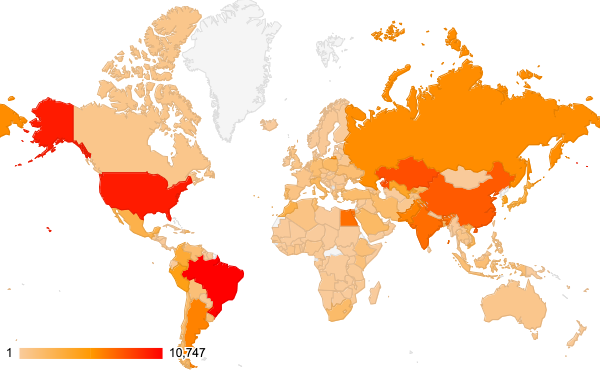 Geographical distribution of spam based on sender IP address.
Geographical distribution of spam based on sender IP address.
While it may seem repetitive to highlight, we continue to note that most of the phishing emails that evade the security solutions’ filters are written in any language but English. These samples appear very rarely among the spam corpus, this fact contributing to the challenge of blocking them in a short period of time.
The following screenshots show some of these phishing emails in Danish, Dutch, Hebrew and Italian.
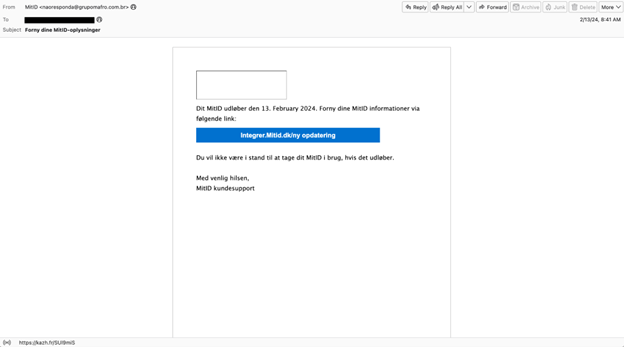 Danish phishing sample.
Danish phishing sample.
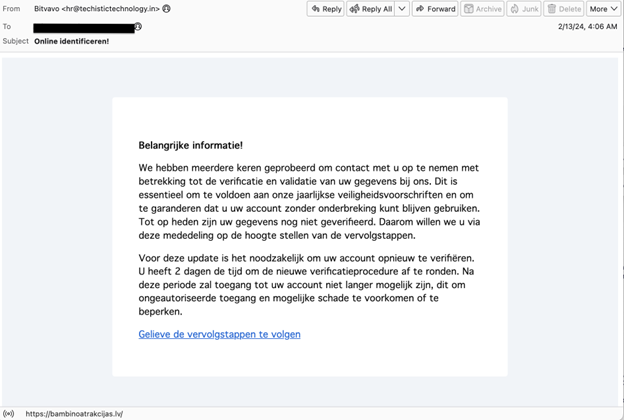 Dutch phishing sample.
Dutch phishing sample.
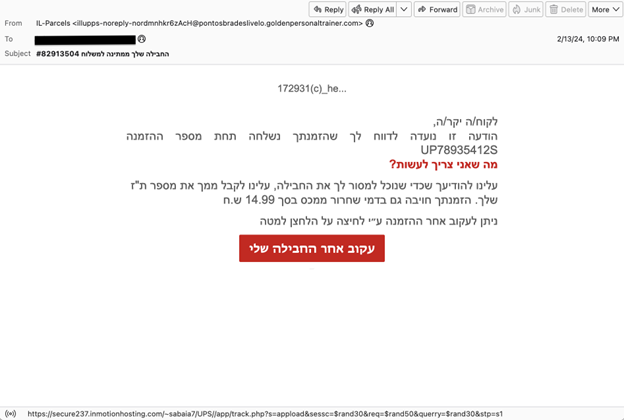 Hebrew phishing sample.
Hebrew phishing sample.
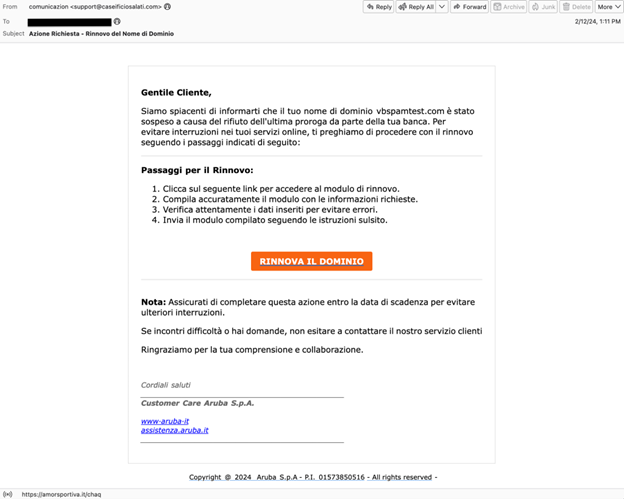 Italian phishing sample.
Italian phishing sample.
Despite the majority of English phishing samples being blocked by most of the VBSpam test participants, there are still some samples that pass through. When this happens it’s usually because the attacker is using a legitimate service to send the email.
In this case we see a Netflix look-a-like email with a Sendgrid URL and an iCloud email address in the ‘Reply‑To’ header.
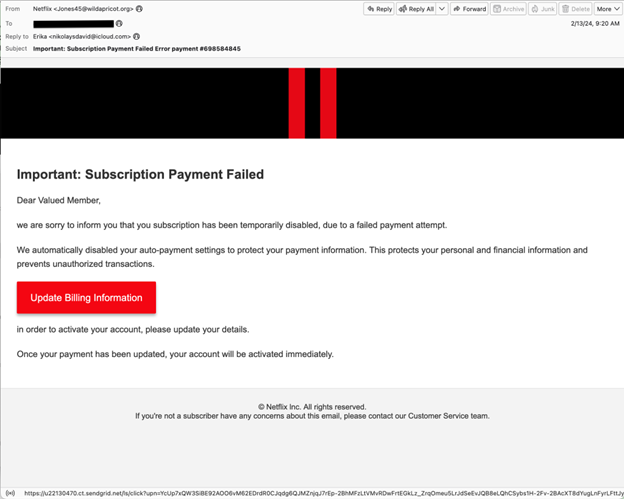 English phishing sample.
English phishing sample.
The most commonly missed malware sample contained a PDF attachment (SHA 256: fcae77a2d05cf3327e9eb5bf397f2c98553675977afd2fb4c1e0bd018cffe4fe) with a Dropbox URL that is reported2 to download a malicious JavaScript file (SHA 256: 2c94db3db031544534f93a25ba1e8fcfe986bf482f1757219ad42b4a03de75b3).
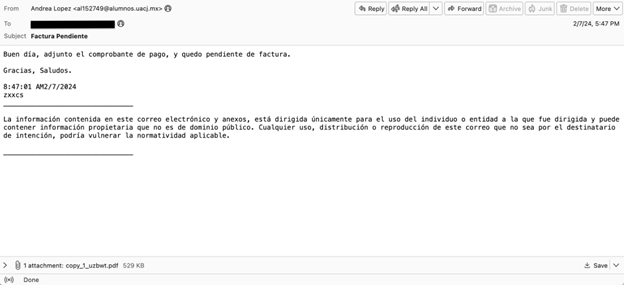 Email with a malicious PDF attachment.
Email with a malicious PDF attachment.
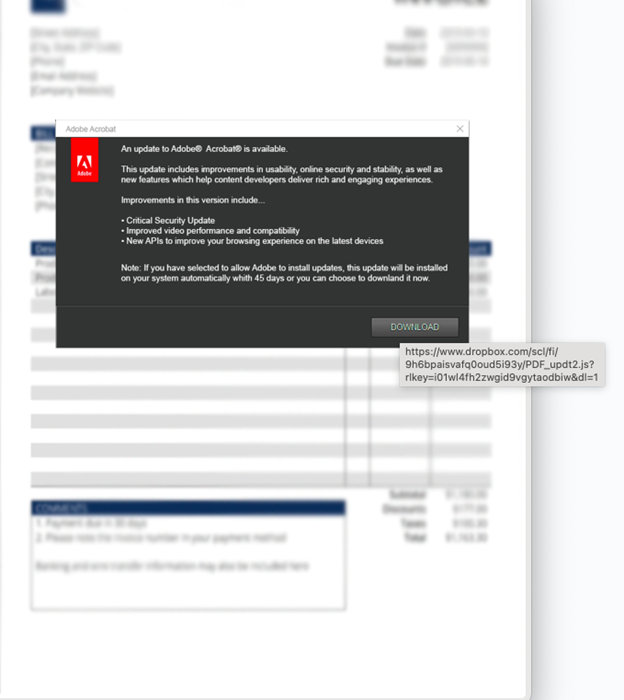 The PDF attachment.
The PDF attachment.
On 9 and 12 February we noticed two malware campaigns lasting for about an hour each time, with the subject ‘Please confirm receipt’ and a zip attachment. The zip3 contained a vbs file (SHA 256: 52a46b6e7500738156e1fd34a3327242db857b876a3dfbf54610e0a10d3406ed) which, via PowerShell, downloaded and executed the XWorm payload.
We mention this campaign because it managed to bypass the filters of many of the participants.
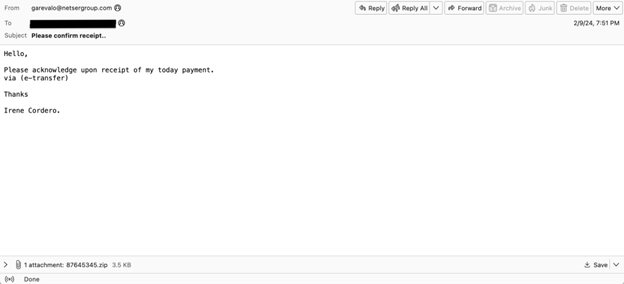 Email sample that leads to XWorm malware.
Email sample that leads to XWorm malware.
The majority of the tested solutions managed to achieve high catch rates both on overall spam samples and on the malware sub-category, with values higher than 99%. In particular, we highlight the performance of SEPPmail.cloud Filter, which didn’t miss any malware or phishing samples.
Of the participating full solutions, one achieved a VBSpam award – SEPPmail.cloud Filter – while eight – Bitdefender GravityZone Premium, FortiMail, Mimecast, N-able Mail Assure, N-Able SpamExperts, Net At Work NoSpamProxy, SpamTitan and Zoho Mail – were awarded a VBSpam+ certification, as was the custom configured solution Spamhaus DQS.
|
SC rate: 99.988%
|
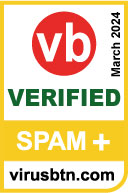 |
Besides a well earned VBSpam+ award, we highlight the excellent performance of Bitdefender’s product in this test with no false negatives on the malware corpus and no false positives of any kind.
|
SC rate: 99.994%
|
 |
Fortinet shows another a great performance in the test with the highest spam catch rate and no false positives. No malware sample bypassed the product’s filters and another VBSpam+ award is added to its track record.
|
SC rate: 99.956%
|
 |
Mimecast achieved a perfect score on the malware corpus, and just one missed sample prevented it from scoring a 100% catch rate on the phishing corpus as well. With no false positives the product starts the 2024 VBSpam testing series with a VBSpam+ award.
|
SC rate: 99.925%
|
 |
N-able Mail Assure continued its run of good performances in this test, earning another VBSpam+ award. In particular we highlight the lack of ham false positives and the higher than 99% phishing catch rate.
|
SC rate: 99.921%
|
 |
With almost identical scores to its sister product, N-able SpamExperts also easily earns VBSpam+ certification in this test.
|
SC rate: 99.986%
|
 |
Net At Work’s email security solution continues to show a balanced performance. It achieved higher than 99.95% catch rates on both the malware corpus and the phishing corpus. With no ham false positives and an overall spam catch rate exceeding 99.95%, it earns VBSpam+ certification.
|
SC rate: 97.066%
|
The open-source Rspamd found dealing with the malware samples a challenge. However, we continue to see good performances from the solution on the overall spam corpus, in this case blocking more than 97% of the samples.
|
SC rate: 99.994%
|
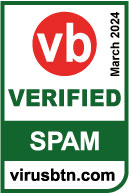 |
The Switzerland-based SEPPmail.cloud Filter scored the highest spam catch rate in this test and was the only solution to have blocked all of the malware and phishing samples. A relatively high false positive rate prevented the solution from achieving a VBSpam+ award, but VBSpam certification is easily earned with this impressive performance.
|
SC rate: 99.763%
|
 |
Spamhaus SpamAssassin Data Query Service (DQS) is a custom configured solution that integrates the Spamhaus DQS DNSBL service and the free open-source solution SpamAssassin. In this test no ham samples were blocked by this combined solution. With a final score of 99.723 the solution earns a VBSpam+ certification.
|
SC rate: 99.983%
|
 |
SpamTitan joins the VBSpam test with an excellent performance, ranking in the top three based on final score. With a spam catch rate exceeding 99.95% and no ham false positives, it is awarded VBSpam+ certification.
|
SC rate: 99.535%
|
 |
Zoho Mail achieved higher than 99% catch rates not only on malware and phishing samples but also on the overall spam corpus, while correctly classifying all the ham samples. For this excellent performance the product earns VBSpam+ certification.
| True negatives | False positives | FP rate | False negatives | True positives | SC rate | Final score | VBSpam | |
| Bitdefender GravityZone Premium | 2505 | 0 | 0.00% | 20 | 168901.4 | 99.988% | 99.988 | |
| FortiMail | 2505 | 0 | 0.00% | 10 | 168911.4 | 99.994% | 99.994 | |
| Mimecast | 2505 | 0 | 0.00% | 75 | 168846.4 | 99.956% | 99.956 | |
| N-able Mail Assure | 2505 | 0 | 0.00% | 127.4 | 168794 | 99.925% | 99.885 | |
| N-able SpamExperts | 2505 | 0 | 0.00% | 133.4 | 168788 | 99.921% | 99.881 | |
| Net At Work NoSpamProxy | 2505 | 0 | 0.00% | 24.2 | 168897.2 | 99.986% | 99.946 | |
| Rspamd | 2499 | 6 | 0.24% | 4956 | 163965.4 | 97.066% | 95.874 | |
| SEPPmail.cloud Filter | 2504 | 1 | 0.04% | 10.2 | 168911.2 | 99.994% | 99.755 | |
| Spamhaus DQS + SpamAssassin‡ | 2505 | 0 | 0.00% | 400 | 168521.4 | 99.763% | 99.723 | |
| SpamTitan | 2505 | 0 | 0.00% | 29.4 | 168892 | 99.983% | 99.983 | |
| Zoho Mail | 2505 | 0 | 0.00% | 785.8 | 168135.6 | 99.535% | 99.495 |
‡Spamhaus Data Query Service (DQS) + SpamAssassin is a fully configured solution that integrates Spamhaus DQS on top of SpamAssassin. Spamhaus DQS is not a stand-alone solution but rather a DNSBL service that can be added to MTAs and email security solutions such as SpamAssasssin. The test set up reflects the real-life performance expected from this combined production deployment, not as individual product elements.
(Please refer to the text for full product names and details.)
| Newsletters | Malware | Phishing | Project Honey Pot | Abusix | MXMailData | STDev† | |||||||
| False positives | FP rate | False negatives | SC rate | False negatives | SC rate | False negatives | SC rate | False negatives | SC rate | False negatives | SC rate | ||
| Bitdefender GravityZone Premium | 0 | 0.0% | 0 | 100.000% | 4 | 99.951% | 0 | 100.000% | 18 | 99.989% | 2 | 99.936% | 0.16 |
| FortiMail | 0 | 0.0% | 0 | 100.000% | 3 | 99.963% | 6 | 99.928% | 4 | 99.997% | 0 | 100.000% | 0.24 |
| Mimecast | 0 | 0.0% | 0 | 100.000% | 1 | 99.988% | 55.8 | 99.334% | 19.2 | 99.988% | 0 | 100.000% | 0.77 |
| N-able Mail Assure | 1 | 1.8% | 32 | 98.695% | 40 | 99.506% | 31.4 | 99.625% | 65 | 99.959% | 31 | 99.002% | 1.02 |
| N-able SpamExperts | 1 | 1.8% | 32 | 98.695% | 40 | 99.506% | 33.4 | 99.601% | 69 | 99.956% | 31 | 99.002% | 1.11 |
| Net At Work NoSpamProxy | 1 | 1.8% | 1 | 99.959% | 3 | 9.963% | 1 | 99.988% | 22.2 | 99.986% | 1 | 99.968% | 0.27 |
| Rspamd | 0 | 0.0% | 1091 | 55.506% | 1633 | 79.825% | 1027.6 | 87.733% | 2631.4 | 98.329% | 1297 | 58.229% | 8.94 |
| SEPPmail.cloud Filter | 1 | 1.8% | 0 | 100.000% | 0 | 100.000% | 10.2 | 99.878% | 0 | 100.000% | 0 | 100.000% | 0.45 |
| Spamhaus DQS + SpamAssassin‡ | 1 | 1.8% | 41 | 98.328% | 42 | 99.481% | 7 | 99.916% | 253 | 99.839% | 140 | 95.491% | 1.33 |
| SpamTitan | 0 | 0.0% | 12 | 99.511% | 7 | 99.914% | 0 | 100.000% | 20.4 | 99.987% | 9 | 99.710% | 0.22 |
| Zoho Mail | 1 | 1.8% | 11 | 99.551% | 20 | 99.753% | 155.4 | 98.145% | 604.4 | 99.616% | 26 | 99.163% | 3.72 |
†The standard deviation of a product is calculated using the set of its hourly spam catch rates.
‡Spamhaus Data Query Service (DQS) + SpamAssassin is a fully configured solution that integrates Spamhaus DQS on top of SpamAssassin. Spamhaus DQS is not a stand-alone solution but rather a DNSBL service that can be added to MTAs and email security solutions such as SpamAssasssin. The test set up reflects the real-life performance expected from this combined production deployment, not as individual product elements.
(Please refer to the text for full product names and details.)
| Speed | ||||
| 10% | 50% | 95% | 98% | |
| Bitdefender GravityZone Premium | ||||
| Fortinet FortiMail | ||||
| Mimecast | ||||
| N-able Mail Assure | ||||
| N-able SpamExperts | ||||
| Net At Work NoSpamProxy | ||||
| Rspamd | ||||
| SEPPmail.cloud Filter | ||||
| Spamhaus Data Query Service (DQS) + SpamAssassin‡ | ||||
| SpamTitan | ||||
| Zoho Mail | ||||
| 0-30 seconds | 30 seconds to two minutes | two minutes to 10 minutes | more than 10 minutes |
‡Spamhaus Data Query Service (DQS) + SpamAssassin is a fully configured solution that integrates Spamhaus DQS on top of SpamAssassin. Spamhaus DQS is not a stand-alone solution but rather a DNSBL service that can be added to MTAs and email security solutions such as SpamAssasssin. The test set up reflects the real-life performance expected from this combined production deployment, not as individual product elements.
| Products ranked by final score | |
| FortiMail | 99.994 |
| Bitdefender GravityZone Premium | 99.988 |
| SpamTitan | 99.983 |
| Mimecast | 99.956 |
| Net At Work NoSpamProxy | 99.946 |
| N-able Mail Assure | 99.885 |
| N-able SpamExperts | 99.881 |
| SEPPmail.cloud Filter | 99.755 |
| Spamhaus DQS + SpamAssassin‡ | 99.723 |
| Zoho Mail | 99.495 |
| Rspamd | 95.874 |
‡Spamhaus Data Query Service (DQS) + SpamAssassin is a fully configured solution that integrates Spamhaus DQS on top of SpamAssassin. Spamhaus DQS is not a stand-alone solution but rather a DNSBL service that can be added to MTAs and email security solutions such as SpamAssasssin. The test set up reflects the real-life performance expected from this combined production deployment, not as individual product elements.
(Please refer to the text for full product names and details.)
| Hosted solutions | Anti-malware | IPv6 | DKIM | SPF | DMARC | Multiple MX-records | Multiple locations |
| Mimecast | Mimecast | √ | √ | √ | √ | √ | |
| N-able Mail Assure | N-able Mail Assure | √ | √ | √ | √ | ||
| N-able SpamExperts | SpamExperts | √ | √ | √ | √ | ||
| Net At Work NoSpamProxy | 32Guards & NoSpamProxy | √ | √ | √ | √ | √ | |
| SEPPmail.cloud Filter | SEPPmail | √ | √ | √ | √ | √ | √ |
| SpamTitan | SpamTitan | √ | √ | √ | √ | √ | √ |
| Zoho Mail | Zoho | √ | √ | √ | √ | √ |
| Local solutions | Anti-malware | IPv6 | DKIM | SPF | DMARC | Interface | |||
| CLI | GUI | Web GUI | API | ||||||
| Bitdefender GravityZone Premium | Bitdefender | √ | √ | √ | √ | ||||
| Fortinet FortiMail | Fortinet | √ | √ | √ | √ | √ | √ | √ | |
| Rspamd | None | √ | |||||||
| Spamhaus Data Query Service (DQS) + SpamAssassin‡ | Optional | √ | √ | √ | √ | ||||
‡Spamhaus Data Query Service (DQS) + SpamAssassin is a fully configured solution that integrates Spamhaus DQS on top of SpamAssassin. Spamhaus DQS is not a stand-alone solution but rather a DNSBL service that can be added to MTAs and email security solutions such as SpamAssasssin. The test set up reflects the real-life performance expected from this combined production deployment, not as individual product elements.
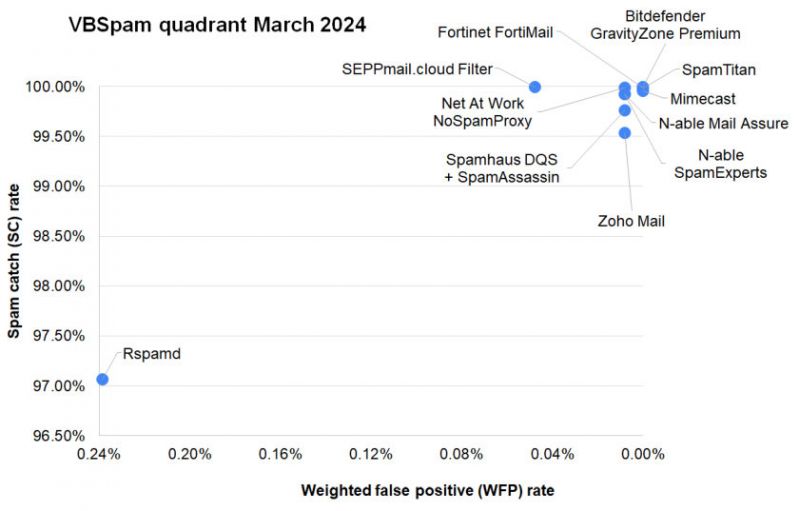 (Please refer to the text for full product names and details.)
(Please refer to the text for full product names and details.)
The full VBSpam test methodology can be found at https://www.virusbulletin.com/testing/vbspam/vbspam-methodology/vbspam-methodology-ver20.
The test ran for 16 days, from 12am on 3 February to 12am on 19 February 2024 (GMT).
The test corpus consisted of 171,511 emails. 168,951 of these were spam, 8,396 of which were provided by Project Honey Pot, 157,450 were provided by Abusix, with the remaining 3,105 spam emails provided by MXMailData. There were 2,505 legitimate emails (‘ham’) and 55 newsletters – a category that includes various kinds of commercial and non-commercial opt-in mailings.
37 emails in the spam corpus were considered ‘unwanted’ (see the June 2018 report) and were included with a weight of 0.2; this explains the non-integer numbers in some of the tables.
Moreover, 2,452 emails from the spam corpus were found to contain a malicious attachment while 8,094 contained a link to a phishing or malware site; though we report separate performance metrics on these corpora, it should be noted that these emails were also counted as part of the spam corpus.
Emails were sent to the products in real time and in parallel. Though products received the email from a fixed IP address, all products had been set up to read the original sender’s IP address as well as the EHLO/HELO domain sent during the SMTP transaction, either from the email headers or through an optional XCLIENT SMTP command4.
For those products running in our lab, we all ran them as virtual machines on a VMware ESXi cluster. As different products have different hardware requirements – not to mention those running on their own hardware, or those running in the cloud – there is little point comparing the memory, processing power or hardware the products were provided with; we followed the developers’ requirements and note that the amount of email we receive is representative of that received by a small organization.
Although we stress that different customers have different needs and priorities, and thus different preferences when it comes to the ideal ratio of false positive to false negatives, we created a one-dimensional ‘final score’ to compare products. This is defined as the spam catch (SC) rate minus five times the weighted false positive (WFP) rate. The WFP rate is defined as the false positive rate of the ham and newsletter corpora taken together, with emails from the latter corpus having a weight of 0.2:
WFP rate = (#false positives + 0.2 * min(#newsletter false positives , 0.2 * #newsletters)) / (#ham + 0.2 * #newsletters)
while in the spam catch rate (SC), emails considered ‘unwanted’ (see above) are included with a weight of 0.2.
The final score is then defined as:
Final score = SC - (5 x WFP)
In addition, for each product, we measure how long it takes to deliver emails from the ham corpus (excluding false positives) and, after ordering these emails by this time, we colour-code the emails at the 10th, 50th, 95th and 98th percentiles:
| (green) = up to 30 seconds | |
| (yellow) = 30 seconds to two minutes | |
| (orange) = two to ten minutes | |
| (red) = more than ten minutes |
Products earn VBSpam certification if the value of the final score is at least 98 and the ‘delivery speed colours’ at 10 and 50 per cent are green or yellow and that at 95 per cent is green, yellow or orange.
Meanwhile, products that combine a spam catch rate of 99.5% or higher with a lack of false positives, no more than 2.5% false positives among the newsletters and ‘delivery speed colours’ of green at 10 and 50 per cent and green or yellow at 95 and 98 per cent earn a VBSpam+ award.
Meanwhile, products that combine a spam catch rate of 99.5% or higher with a lack of false positives, no more than 2.5% false positives among the newsletters and ‘delivery speed colours’ of green at 10 and 50 per cent and green or yellow at 95 and 98 per cent earn a VBSpam+ award.
1 Spamhaus Data Query Service (DQS) + SpamAssassin is a custom solution built on top of the SpamAssassin open-source anti-spam platform.
2 https://bazaar.abuse.ch/sample/fcae77a2d05cf3327e9eb5bf397f2c98553675977afd2fb4c1e0bd018cffe4fe/#intel.
3 https://bazaar.abuse.ch/sample/52a46b6e7500738156e1fd34a3327242db857b876a3dfbf54610e0a10d3406ed/.
4 http://www.postfix.org/XCLIENT_README.html.
This section allows you to create a simulated combination of products and view how your synthetized combination would have performed in this test. This is primarily useful for complementary (partial) products, which are rarely used in isolation, but rather they are added on top of base product, potentially along with other complementary products.
Note that the simulation does not employ the same email category weight rules as the VBSpam test normally does and therefore you might get slightly different figures than those in the test report (lower spam detection and higher false positive rates).